Lords defeats set to delay Rwanda bill becoming lawpublished at 20:06 GMT 20 March 2024
Peers vote for changes to the government's legislation, which will delay it further from becoming law.
Read MorePeers vote for changes to the government's legislation, which will delay it further from becoming law.
Read MoreWe'll be back on Friday
That's all from the BBC Africa Live team for this week.
Until we're back, there'll be an automated service here, plus you can get the latest news on our website or listen to our podcasts - Africa Daily and Focus on Africa.
Our African proverb of the day:
Quote MessageLife, like a wheel, turns."
A Setswana proverb sent by Indomitable Phaladi, in Gaborone, Botswana
Click here to send us your African proverbs.
And we leave you with this shot of athletes competing in the mixed relay final at the 13th African Games being hosted in Ghana.
 Image source, AFP
Image source, AFP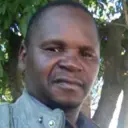 Jose Tembe
Jose Tembe
BBC News, Maputo
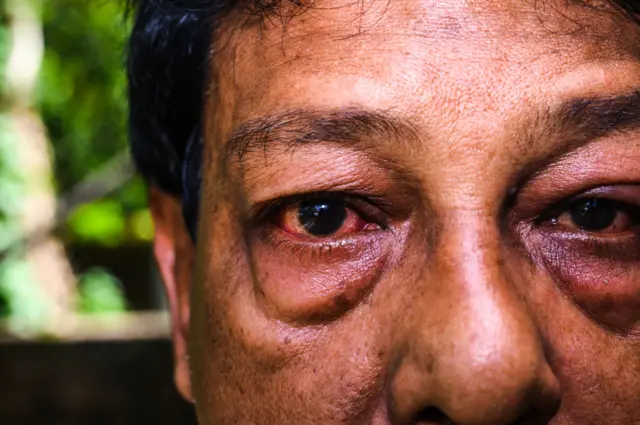 Image source, Getty Images
Image source, Getty ImagesConjunctivitis, or pink eye, is an irritation or inflammation of the conjunctiva, which covers the white part of the eyeball (file photo)
A man in Mozambique has gone blind after using traditional medicine and urine to cure conjunctivitis.
Babu Aiuba is currently receiving treatment at Central Hospital of Quelimane.
He told local reporters he had contracted haemorrhagic conjunctivitis earlier this month.
"I washed my eyes with soap and urine," he said.
Mr Aiuba said this was "a practice of people in the neighbourhood".
But this only made his eye worse. He eventually lost his sight.
Ophthalmologist Eugénia Cavele said the use of traditional medicines made the bacterial conjunctivitis progress to blindness.
“I would like to warn everyone who has symptoms or signs of conjunctivitis not to use substances that are not scientifically proven and not to self-medicate, as this can lead to stages of blindness,” Mr Cavele said.
This is the first case of blindness caused by traditional treatment since haemorrhagic conjunctivitis broke out in Mozambique.
Haemorrhagic conjunctivitis now affects almost all Mozambican provinces, including the capital, Maputo.
Authorities have also reported cases of conjunctivitis at the Maputo Provincial Penitentiary Establishment.
At least 270 inmates of the prison are infected.
Conjunctivitis outbreaks have also hit several other countries in east and southern Africa.
Customers who don't return money they withdrew face prosecution, an Ethiopian bank chief tells the BBC.
Read More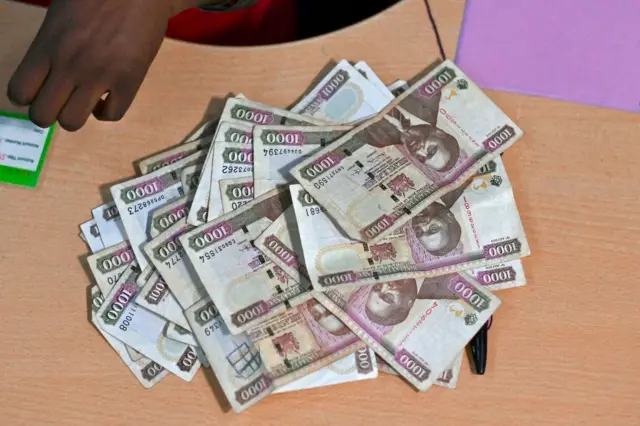 Image source, AFP
Image source, AFPKenya's second-largest bank, KCB Group, has sold its subsidiary National Bank of Kenya (NBK) to Nigeria's Access Bank Group.
KCB confirmed the purchase in a statement on Wednesday.
KCB chief executive Paul Russo said the deal was struck at 1.25 times book value, according to Reuters news agency.
"The right thing to do is to accept a binding offer from Access Group," he said.
KCB acquired then state-owned NBK in a rescue deal in October 2019, after the bank posted recurrent losses.
But KCB has struggled to fix the issues it inherited.
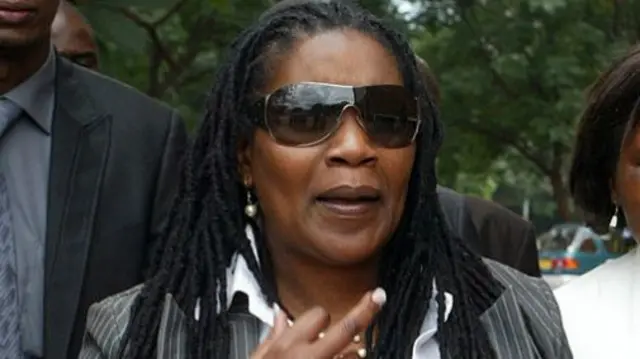 Image source, AFP
Image source, AFPThe mining boss has been embroiled in multiple scandals over the years
The president of the Zimbabwe Miners Federation (ZMF) has been arrested for fraud after allegedly attempting to sell three mines she doesn't own.
Police spokesperson Paul Nyathi told local media that Henrietta Rushwaya had been taken into police custody after a complaint had been received about mining transactions.
Mr Nyathi added that Ms Rushwaya was "assisting police with investigations".
She appeared in court on Wednesday and the state prosecutor opposed bail.
Last year Ms Rushwaya was convicted of trying to smuggle gold worth over $330,000 (£272,000) out of Zimbabwe in 2020.
She was a central figure in the Al-Jazeera Gold Mafia documentary which exposed how huge amounts of gold had been smuggled out of Zimbabwe to the United Arab Emirates.
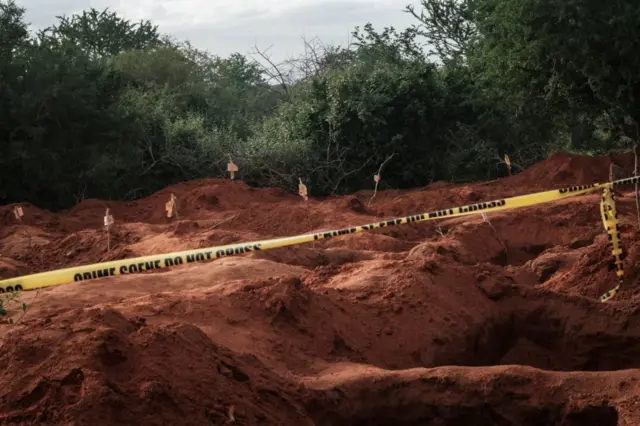 Image source, AFP
Image source, AFPMore than 400 bodies were dug up from mass graves in Kenya
The Kenyan government says it will release some of the bodies belonging to victims of the Shakahola starvation cult next week.
At least 34 bodies have been identified and linked to their families, out of the hundreds that were exhumed last year.
The bodies of 429 people, including children, were dug up from graves in Shakahola, a remote forest outside the coastal town of Malindi. Most showed signs of starvation and assault.
Survivors and victims' families said self-proclaimed pastor Paul Mackenzie encouraged members of his Good News International Church to move there and prepare for the end of the world.
Survivors say he instructed them to fast so that they could "get to heaven".
The government will counsel victims' families but will not assist them to transport the bodies for burial, said chief government pathologist Dr Johansen Oduor on Wednesday.
Mr Mackenzie has denied responsibility for the deaths. He and several of his followers are currently on trial for several charges, including terrorism, murder and torture.
New exhumations are scheduled to be done in one to two weeks, Dr Oduor said, adding that 35 more grave sites have been identified.
The planned fresh exhumations could drive up the death toll further.
Dr Oduor said linking bodies to their families had been slow because "people are not coming up to claim their loved ones".
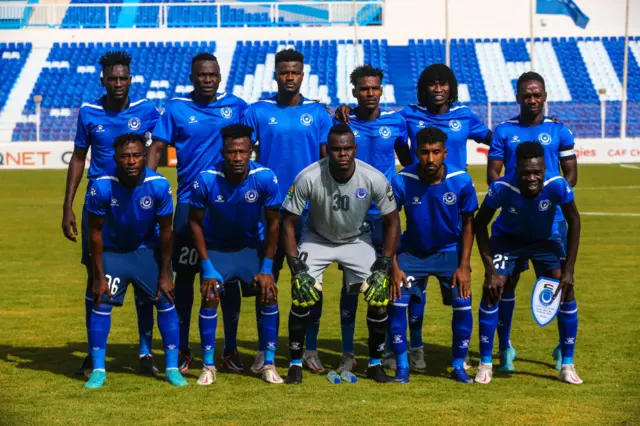 Image source, Getty Images
Image source, Getty ImagesSport is suspended in Sudan because of the ongoing war
Tanzania has agreed to let Sudanese football club Al Hilal compete in their premier league, while war continues to rage in Sudan.
Al Hilal will compete in the Tanzania Mainland Premier League starting in August, under special conditions.
The Sudanese club will not be able to win the league and their matches will only count as friendlies, according to AFP news agency.
Tanzanian Football Federation spokesman Clifford Mario Ndimbo told local media Al Hilal's participation would benefit the country's league.
"They are a big club with an excellent reputation and their presence will generate excitement," he said.
He added that Sudanese referees who are in Tanzania will also get an opportunity to officiate matches.
"It's an opportunity for the Tanzanian clubs to learn from one of the continent's football giants and promote the local league," Mr Ndimbo told AFP.
Al Hilal requested to take part in the league as sport is suspended in Sudan because of the conflict which has killed thousands and displaced millions since April 2023.
More on the war in Sudan:
 Will Ross
Will Ross
Africa editor, BBC World Service
At least 15 people including senior officials have been killed in an ambush in South Sudan.
Officials say the commissioner of Boma county in Pibor was returning from a visit to a village on Tuesday, when youths from a rival community attacked .
He was killed along with his bodyguards and Boma's deputy army commander.
A 2018 peace deal ended a five year civil war in South Sudan.
But several areas including Boma county have experienced outbreaks of ethnic violence.
These have often been revenge attacks for cattle raids, involving the Murle, Anyuak, Nuer and Dinkas ethnic groups.
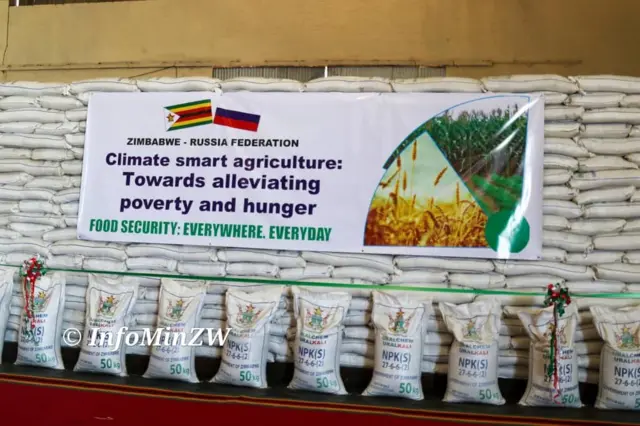 Image source, Zimbabwe Information Ministry/X
Image source, Zimbabwe Information Ministry/XRussia's grain transfer program also covers Burkina Faso, Mali, Eritrea, Somalia and the Central African Republic
Zimbabwe's President Emmerson Mnangagwa has received 250,000 tonnes of wheat donated by the Russian government and 23,000 tonnes of fertiliser provided by the Uralchem-Uralkali group of Russian companies.
Russia's ambassador to Zimbabwe Nikolai Krasilnikov said on Wednesday that the grain transfer is "humanitarian assistance".
"Both deliveries were carried out in line with the implementation of the initiative of the President of the Russian Federation Vladmir Putin to provide assistance to African countries," Mr Krasilnikov added.
Last year Russia announced a free grain transfer programme to African countries.
Aside from Zimbabwe, the programme also covers Burkina Faso, Mali, Eritrea, Somalia and the Central African Republic.
The aid comes as Zimbabwe and several other southern African countries battle food shortages due to an ongoing drought attributed to the El Niño weather phenomenon.
El Niño shifts weather patterns, leading to droughts or excessive rainfall.
The UN World Food Programme said in January that 2.7 million rural Zimbabweans require food aid.
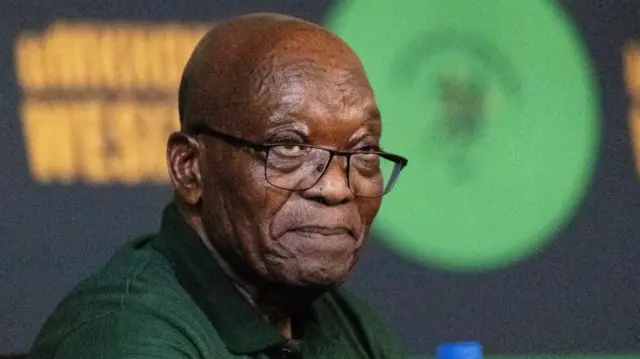 Image source, EPA
Image source, EPAThis is the second time the former South African president is attempting to remove the prosecutor
A court in South Africa has dismissed former President Jacob Zuma's bid to remove a prosecutor in a corruption case against him.
Mr Zuma's legal team has accused state prosecutor Billy Downer of bias in the arms deal graft case.
The former president failed to prove how Mr Downer’s continued presence as his prosecutor would violate his right to a fair trial, the Kwazulu-Natal High Court in Pietermaritzburg ruled on Wednesday.
This is the second time Mr Zuma has tried and failed to remove Mr Downer from the arms deal trial.
In May 2021, he unsuccessfully sought the prosecutor's removal in court.
Mr Zuma is facing 16 charges of corruption over a multi-billion dollar arms deal, in a case that has dragged on for years as the former president challenges attempts by the prosecution to put him on trial.
Read more on the arms deal scandal:
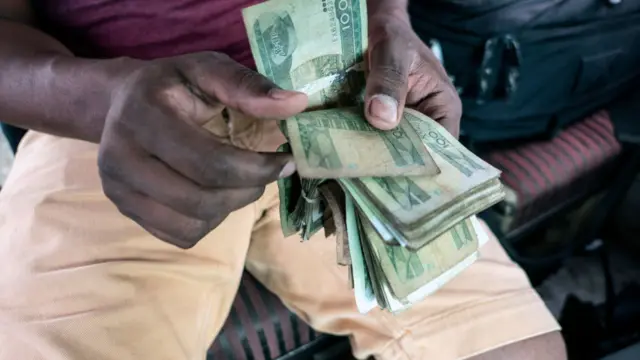 Image source, Getty Images
Image source, Getty ImagesCBE President Abe Sano says customers who withdrew more money than they had in their accounts "cannot escape"
Ethiopia's largest commercial bank has given customers who withdrew more money than they had in their accounts until the end of the week to return it or face arrest and prosecution.
Local media reported that more than $40m (£31m) was withdrawn or transferred to other banks on Saturday during a system glitch lasting several hours at the state-owned Commercial Bank of Ethiopia (CBE).
In an interview with the BBC Newsday programme, CBE President Abe Sano on Wednesday said the bank has traced most of the transactions conducted during the glitch.
When asked whether CBE would report those who don't return the money to the police, Mr Abe replied:
"Yeah, yeah, for sure. We are doing already".
He added that the bank will take legal action against those who will not have returned the funds "after this weekend".
"There is no way that they can escape because they are digital [transactors] and they are our customers. We know them. They are traceable and they are legally accountable for what they did," Mr Abe told Newsday.
Some of the customers who withdrew excess money have already returned it to the bank, Mr Abe said.
He however disputed the reports that customers took $40m, saying the amount taken was far smaller but will be accurately determined after an ongoing audit is completed later this week.
Mr Sano added that the audit is being done because some of the 10,000 customers who transacted during the glitch conducted legitimate transactions.
Read more:
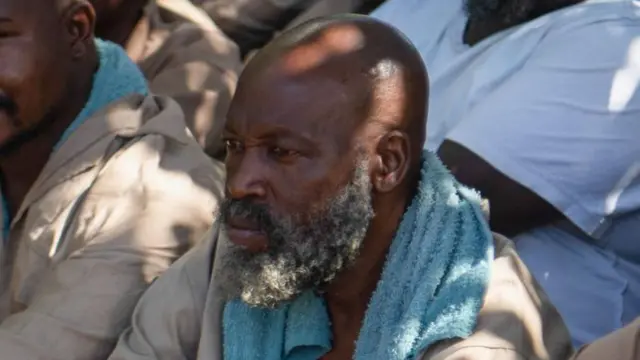 Image source, EPA
Image source, EPAIshmael Chokurongerwa and co-accused are yet to take plea
The leader of a religious sect in Zimbabwe has been denied bail after his arrest last week for suspected child abuse.
Ishmael Chokurongerwa was charged with exploiting minors after police found 251 children working on his farm. Unregistered graves, believed to be of infants, were also found.
The self-proclaimed Apostolic prophet appeared in court in the town of Norton near the capital Harare on Tuesday, alongside seven of his church members.
They were not asked to plead, Reuters news agency reported.
The court ruled that Chokurongerwa could use his influence to interfere with witnesses if granted bail and that there would be a public outcry if he was released.
The suspects, who were charged with violating children's rights and contravening burial and cremation laws, will remain in custody until next month when the next hearing is scheduled.
Read more on the Zimbabwe sect:
The Suffolk Bishops' Lent Appeal is focusing on agricultural challenges in Kagera, Tanzania.
Read More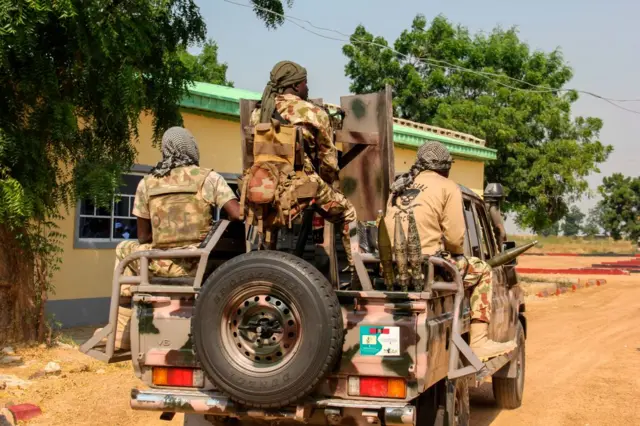 Image source, AFP
Image source, AFPThe military denies allegations it ran a secret mass abortion programme
Nigeria's human rights commission has concluded an investigation into allegations that the country's military ran a secret mass abortion programme.
A report published by Reuters news agency, external in December 2022 alleged that the Nigerian army terminated at least 10,000 pregnancies among girls and women in the north-east of the country, beginning in 2013.
Many of those girls and women were freed from Islamic militants who had kidnapped and raped them, the report said.
Reuters interviewed 33 of the women, with all but one of them alleging that the military ended their pregnancies without their consent or prior knowledge.
The National Human Rights Commission (NHRC) formed a panel that started investigating the allegations in February last year.
"The military urged the panel to absolve it from all the allegations contained in the Reuters report," the NHRC said in a post on X, external, formerly Twitter on Tuesday, as it announced the conclusion of its investigation.
The rights body has not disclosed the investigation's findings or said whether it will make them public.
Reuters said it had reviewed military and hospital documents and interviewed dozens of witnesses, including civilian healthcare workers and soldiers and government officials reportedly involved in the alleged abortion programme.
The military denied the report when it first came out.
Macky Sall refuses to apologise for the deaths that followed the decision to postpone elections last month.
Read More BBC Monitoring
BBC Monitoring
The world through its media
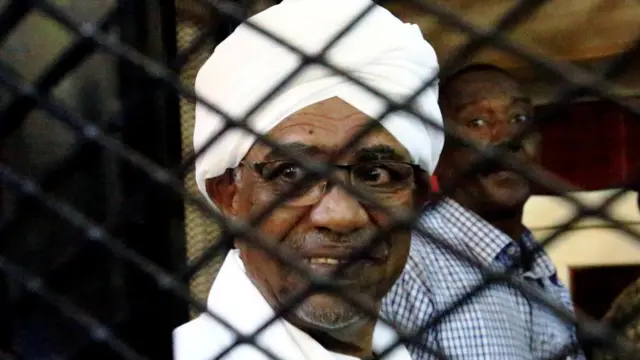 Image source, Reuters
Image source, ReutersMr Bashir has been receiving treatment at a military hospital in Omdurman city
A lawyer of former Sudanese president, Omar al-Bashir, has said his client has been moved from a hospital where he has been since war broke out in the country in April last year to "a secure military site".
Mohamed al-Hassan al-Amin told Sudan Tribune news website that the former leader, alongside four others, have been transferred from the Medical Corps after health care there "ran out completely".
Mr Bashir, who had been convicted for corruption and was facing trial for leading a military coup in 1989, was receiving treatment at a military hospital in Omdurman city that came under siege by the paramilitary Rapid Support Forces (RSF).
Sudan’s regional and international partners have failed to mediate between the army and RSF throughout the war that has killed at least 14,000 people and displaced about 10 million others.
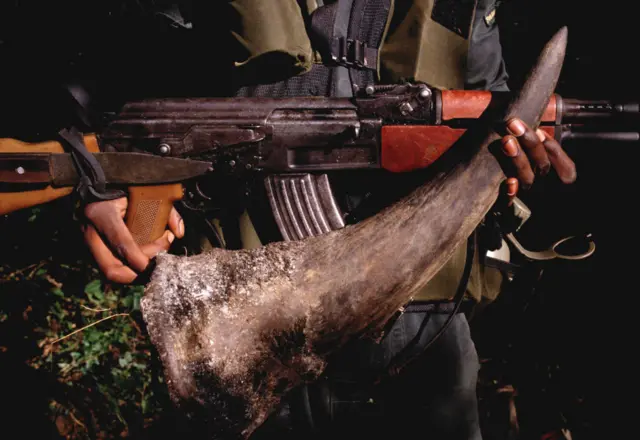 Image source, Getty Images
Image source, Getty ImagesFifteen tusks of elephants were recovered during the incident (file photo)
Two suspected poachers have been shot dead in a shootout with Zimbabwe rangers, near the Kazungula border post in Matabeleland North province.
Three other suspects were arrested and one of them managed to escape during Tuesday's incident, Zimbabwe Parks and Wildlife Management Authority (Zimparks) spokesperson, Tinashe Farawo, posted on X (formerly Twitter).
“We have recovered about 15 tusks of elephants, a point 375 rifle and five rounds of ammunition," Mr Farawo said, adding that investigations were in progress.
The incident comes barely two months after six elephants were killed by poisoning before their tusks were removed by suspected poachers in Shangani Wildlife Conservancy, which is close to Hwange National Park.
Wildlife conservationists have called for stiffer poaching regulations in Zimbabwe.
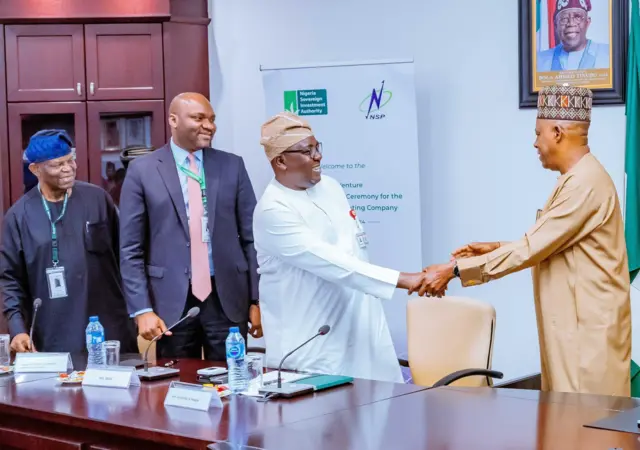 Image source, Nigeria Office of the Vice President
Image source, Nigeria Office of the Vice PresidentThe project will help diversify Nigeria's energy sources and propel its transition to clean energy
Nigeria has signed a deal to build a 20MW hybrid hydro-solar power generating plant, the first instalment in a 300MW project.
The project is part of the country's plan to transition to clean and renewable energy solutions.
The project will be built in Shiroro, in the central Niger state and will be a collaboration between the privately owned North South Power (NSP) Company and the state-run Nigeria Sovereign Investment Authority (NSIA).
"This is a pioneering project in terms of hybridising power in solar and hydro," Nigeria's Vice-President Kashim Shettima said during the signing of the agreement on Tuesday.
He added that it will help the country diversify its energy sources.
Nigeria has faced power problems for years, despite being a major gas and oil producer.
The country's inadequate and inconsistent electricity supply often causes widespread blackouts and power cuts and occasionally leads to total failure of the national power grid.
Most homes and businesses usually resort to generators, inverters and other sources of electricity to avoid dependence on the unreliable national grid.
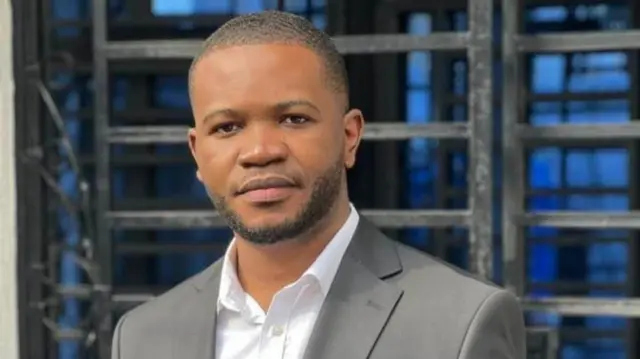 Image source, Stanis Bujakera/Facebook
Image source, Stanis Bujakera/FacebookProsecutors had asked that Mr Bujakera be jailed for 20 years
A prominent journalist in the Democratic Republic of Congo has walked free from the notorious Makala prison in the capital, Kinshasa, despite an attempt by the authorities to block his release.
Stanis Bujakera was sentenced to six months in prison on Monday for spreading false information, but had already served that time in pre-trial detention.
State prosecutors filed an appeal, claiming the sentence was too lenient but after several hours delay, Mr Bujakera was let go.
Prosecutors had asked that Mr Bujakera be jailed for 20 years.
Rights groups called his arrest an attack on press freedom.
He was accused of authoring an article in French-language magazine Jeune Afrique in July, which alleged the military was involved in the killing of prominent opposition politician, Cherubin Okende.
The article was unsigned and did not bear Mr Bujakera's byline.
Mr Okende, a former minister and spokesman for the opposition party Ensemble Pour la Republique (United for the Republic), disappeared in July last year.
His bullet-riddled body was later found in his car in Kinshasa.